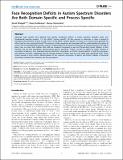Face Recognition Deficits in Autism Spectrum Disorders Are Both Domain Specific and Process Specific
Author(s)
Weigelt, Sarah; Koldewyn, Kami; Kanwisher, Nancy
DownloadWeigelt-2013-Face recognition def.pdf (362.3Kb)
PUBLISHER_CC
Publisher with Creative Commons License
Creative Commons Attribution
Terms of use
Metadata
Show full item recordAbstract
Although many studies have reported face identity recognition deficits in autism spectrum disorders (ASD), two fundamental question remains: 1) Is this deficit “process specific” for face memory in particular, or does it extend to perceptual discrimination of faces as well? And 2) Is the deficit “domain specific” for faces, or is it found more generally for other social or even nonsocial stimuli? The answers to these questions are important both for understanding the nature of autism and its developmental etiology, and for understanding the functional architecture of face processing in the typical brain. Here we show that children with ASD are impaired (compared to age and IQ-matched typical children) in face memory, but not face perception, demonstrating process specificity. Further, we find no deficit for either memory or perception of places or cars, indicating domain specificity. Importantly, we further showed deficits in both the perception and memory of bodies, suggesting that the relevant domain of deficit may be social rather than specifically facial. These results provide a more precise characterization of the cognitive phenotype of autism and further indicate a functional dissociation between face memory and face perception.
Date issued
2013-09Department
Massachusetts Institute of Technology. Department of Brain and Cognitive Sciences; McGovern Institute for Brain Research at MITJournal
PLoS ONE
Publisher
Public Library of Science
Citation
Weigelt, Sarah, Kami Koldewyn, and Nancy Kanwisher. “Face Recognition Deficits in Autism Spectrum Disorders Are Both Domain Specific and Process Specific.” Edited by Marina Pavlova. PLoS ONE 8, no. 9 (September 11, 2013): e74541.
Version: Final published version
ISSN
1932-6203